Charlie Bartlett
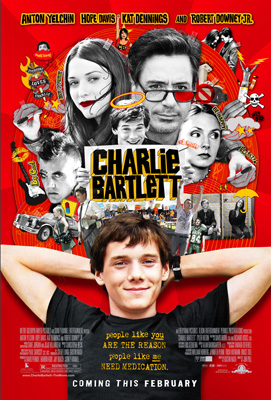
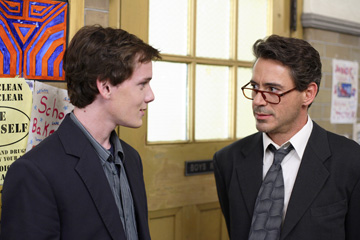 The title character is portrayed by rising young star Anton Yelchin (from Alpha Dog), and when we first meet Charlie, he's just been expelled from a private school for selling fake drivers licenses to the other students. His slightly ditzy mother, Marilyn (Hope Davis), decides that her son should try his hand at a public school. Almost as soon as he steps into the world of public high school, Charlie realizes he's going to have to play against the rules if he wants to make a name for himself in this strange new world. He concocts a plan where he sells prescription drugs to the other students that the many narrow-minded therapists his mom sends him to (who seem more interested in doping Charlie up rather than listening to his problems) keep on trying to put him on. Furthermore, his talent for listening to other people's problems and helping them inspires him to open a counseling service right in the school's restroom, where students can anonymously step into the bathroom stall, and tell him their troubles. Charlie quickly becomes the talk of the school, and he wins the attention of the entire student body. The school's alcoholic and emotionally distant principal (Robert Downey Jr) eventually begins to catch on that the balance of power in his school is starting to shift to this student who came out of nowhere, and becomes further threatened when Charlie begins dating his daughter, Susan (Kat Dennings).
The title character is portrayed by rising young star Anton Yelchin (from Alpha Dog), and when we first meet Charlie, he's just been expelled from a private school for selling fake drivers licenses to the other students. His slightly ditzy mother, Marilyn (Hope Davis), decides that her son should try his hand at a public school. Almost as soon as he steps into the world of public high school, Charlie realizes he's going to have to play against the rules if he wants to make a name for himself in this strange new world. He concocts a plan where he sells prescription drugs to the other students that the many narrow-minded therapists his mom sends him to (who seem more interested in doping Charlie up rather than listening to his problems) keep on trying to put him on. Furthermore, his talent for listening to other people's problems and helping them inspires him to open a counseling service right in the school's restroom, where students can anonymously step into the bathroom stall, and tell him their troubles. Charlie quickly becomes the talk of the school, and he wins the attention of the entire student body. The school's alcoholic and emotionally distant principal (Robert Downey Jr) eventually begins to catch on that the balance of power in his school is starting to shift to this student who came out of nowhere, and becomes further threatened when Charlie begins dating his daughter, Susan (Kat Dennings).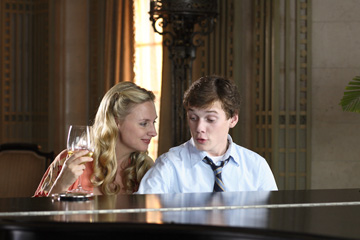 There's nothing in Charlie Bartlett that hasn't been said before, but the way the movie says it in an intelligent and thought provoking manner. This is a movie that remembers when the most important thing in a person's life is to be "popular" and to be seen as someone important in the eye of his or her peers. While this desire exists in some form in nearly every stage of life, it is almost pivotal in those awkward teen years, where nothing else seems to matter. For Charlie, acceptance is especially important. His mother turns a blind eye to his problems, the many therapists he sees seem to think the answers lie at the bottom of a bottle of Ritalin, and his father's sitting in prison on a tax evasion charge. He finds that listening and helping others not only takes his mind off of his own problems at home, but also helps him earn that all-important popularity. With his talking and listening skills, he is able to win over the school bully (Tyler Hilton), and even reach a few teens who couldn't be reached before. One of the film's strengths is that it portrays its characters and situations in a realistic manner. While it is mainly being billed as a comedy, the movie walks along a delicate tightrope as it veers from one tone to the next. Sometimes the change in tone is quite abrupt and jarring (we go from a light-hearted party sequence, to one of Charlie's peers attempting suicide by overdose in the very next scene), but for the most part, editor turned filmmaker Jon Poll does a good job of tackling the film's many sides.
There's nothing in Charlie Bartlett that hasn't been said before, but the way the movie says it in an intelligent and thought provoking manner. This is a movie that remembers when the most important thing in a person's life is to be "popular" and to be seen as someone important in the eye of his or her peers. While this desire exists in some form in nearly every stage of life, it is almost pivotal in those awkward teen years, where nothing else seems to matter. For Charlie, acceptance is especially important. His mother turns a blind eye to his problems, the many therapists he sees seem to think the answers lie at the bottom of a bottle of Ritalin, and his father's sitting in prison on a tax evasion charge. He finds that listening and helping others not only takes his mind off of his own problems at home, but also helps him earn that all-important popularity. With his talking and listening skills, he is able to win over the school bully (Tyler Hilton), and even reach a few teens who couldn't be reached before. One of the film's strengths is that it portrays its characters and situations in a realistic manner. While it is mainly being billed as a comedy, the movie walks along a delicate tightrope as it veers from one tone to the next. Sometimes the change in tone is quite abrupt and jarring (we go from a light-hearted party sequence, to one of Charlie's peers attempting suicide by overdose in the very next scene), but for the most part, editor turned filmmaker Jon Poll does a good job of tackling the film's many sides.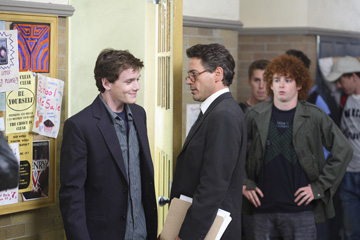 If there's any problem with Charlie Bartlett, it's that it seems to draw inspiration from one too many past films. Its most closest relative is the early 90s Christian Slater film, Pump Up the Volume. It's tone is not quite the same, but many of the plot points are similar. Viewers may also draw comparison to other teen films as Rushmore, or even a little bit of Ferris Bueller. What helps the movie set itself apart is the intelligent screenplay by Nash, and the talent on display. Anton Yelchin obviously relishes his role, as he is able to nail all of his character's personality, quirks, and faults almost to a tee. He makes Charlie Bartlett into someone who is crying out for attention, and has been forced to grow up a little too quickly due to his home situation. As his love interest, Kat Dennings is able to take a somewhat underwritten character, and turn it into a charming performance that makes it easy to see why young Bartlett is drawn to her. The real stand out performance, however, belongs to Robert Downey Jr as a Principal who is probably ill-equiped for his career of managing young minds, and drowns his sorrows in self pity and alcohol. There's a scene late in the film between Yelchin and Downey, where the two have a final confrontation, and Downey's performance here is honest and heartbreaking. He's a deep, rounded character who comes across as being much more than an out of touch adult that a lesser screenplay would have treated him as.
If there's any problem with Charlie Bartlett, it's that it seems to draw inspiration from one too many past films. Its most closest relative is the early 90s Christian Slater film, Pump Up the Volume. It's tone is not quite the same, but many of the plot points are similar. Viewers may also draw comparison to other teen films as Rushmore, or even a little bit of Ferris Bueller. What helps the movie set itself apart is the intelligent screenplay by Nash, and the talent on display. Anton Yelchin obviously relishes his role, as he is able to nail all of his character's personality, quirks, and faults almost to a tee. He makes Charlie Bartlett into someone who is crying out for attention, and has been forced to grow up a little too quickly due to his home situation. As his love interest, Kat Dennings is able to take a somewhat underwritten character, and turn it into a charming performance that makes it easy to see why young Bartlett is drawn to her. The real stand out performance, however, belongs to Robert Downey Jr as a Principal who is probably ill-equiped for his career of managing young minds, and drowns his sorrows in self pity and alcohol. There's a scene late in the film between Yelchin and Downey, where the two have a final confrontation, and Downey's performance here is honest and heartbreaking. He's a deep, rounded character who comes across as being much more than an out of touch adult that a lesser screenplay would have treated him as.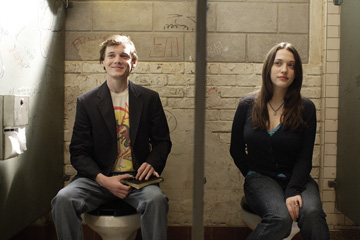
See the movie times in your area or buy the DVD at Amazon.com!






0 Comments:
Post a Comment
<< Home